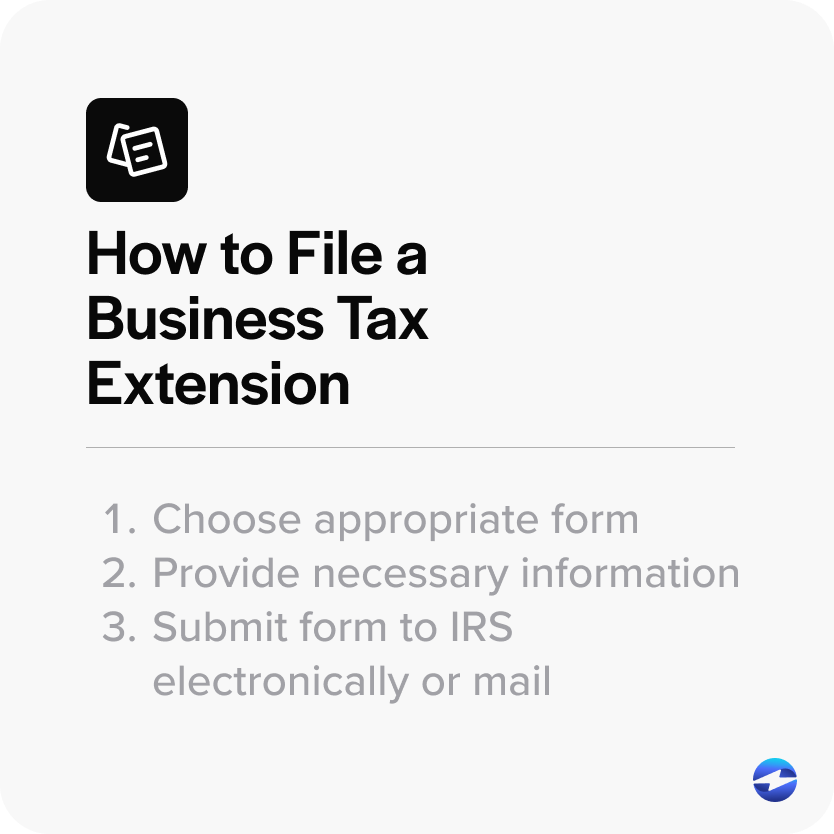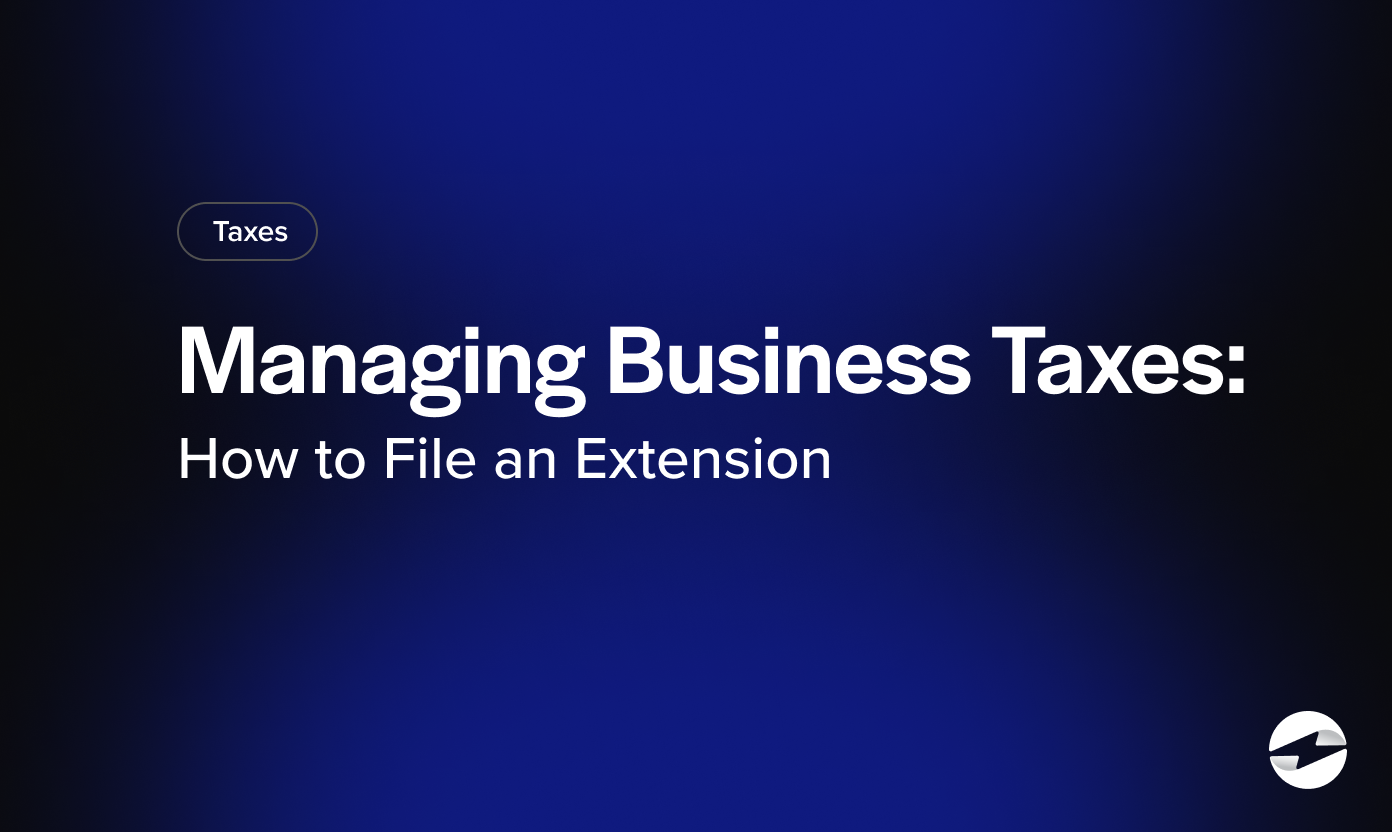Blog > Managing Business Taxes: How to File an Extension
Managing Business Taxes: How to File an Extension
When filing taxes, it can often feel like a race against the clock to collect all the necessary documents. In fact, it was estimated that over 40% of small businesses dedicate more than 80 hours each year to managing their taxes.
When faced with time constraints, applying for a business tax extension can provide additional time to get your taxes in order.
This article will explain how to file a business tax extension so you can better manage your finances and be confident in the accuracy of your tax returns.
What is a tax extension?
A tax extension is a formal request sent to the Internal Revenue Service (IRS) for additional time to file your business tax return. Once permitted, this extension typically provides an additional 6 months to gather necessary documentation, review financial records, and ensure accurate and complete filing.
While this extension grants more time to verify your documents are accurate, it doesn’t extend the deadline for paying any taxes owed. These payments are still due by the original deadline, so it’s essential to pay on time to avoid potential penalties and interest.
When should businesses file their taxes?
The standard deadline for filing a business tax return is April 15. However, filing an extension for business taxes can push this deadline to October 15.
There are numerous reasons for extending the deadline, some of which are beyond a business’s control.
5 common reasons for filing business tax extensions
Among the reasons why businesses might file an extension on business taxes, here are five of the most prominent:
- Complex tax situations: Businesses with multiple revenue streams, international operations, or complex investment portfolios may require additional time to accurately organize and report their financial information.
- Waiting for essential documents: In some cases, businesses may be waiting to receive crucial tax documents, such as K-1 forms, from their investors or partners. An extension permits time for these documents to arrive and be factored into the tax return.
- Audit concerns: If a business anticipates a higher risk of IRS scrutiny or audit, an extension provides additional time to review and validate all tax information carefully.
- Schedule conflicts: Particularly in small business operations, where resources might be stretched thin, tax season may coincide with other critical business periods, such as product launches or peak seasons, necessitating a business tax extension.
- Unexpected events: An unforeseen event, like a natural disaster or personal emergency, may disrupt regular business operations, making a corporate tax extension necessary to manage tax obligations without compromising daily business tasks.
Before filing an extension, it’s important to understand any penalties associated with this request.
Are there penalties for filing for an extension?
While there are no penalties for filing a business tax extension, you may incur interest and penalties on the unpaid amount if you fail to pay any tax by the original deadline since this extension only provides extra time for filing the return, not for paying any taxes due.
Some penalties that may result from failing to pay your taxes on time include:
- Late payment penalties: This penalty is assessed as a percentage of the unpaid tax amount. The exact rate can vary by jurisdiction and the type of tax owed. For example, the IRS typically charges a late payment penalty of 0.5% of any unpaid taxes per month, up to a maximum of 25% of the outstanding amount.
- Interest charges: In addition to the late payment penalty, interest is typically charged on the unpaid tax amount. The interest rate may be variable and can change periodically, so it’s essential to check the current rates with the tax authority.
- Failure to file penalty: If you don’t file your tax return by the deadline, you can be subject to a separate, more substantial penalty than other late payment penalties.
- Tax Lien: If you continue to ignore your tax debt, the tax authority may place a lien on your property or assets. A tax lien gives the government a legal claim to your property and can affect your ability to sell or borrow against your assets.
- Tax levy: In more severe cases, the tax authority can issue a levy, which allows them to seize and sell your property or assets to satisfy your tax debt. This can include wage garnishments or seizing money from your bank accounts.
With such stringent measures to assure taxes are paid on time, it’s important to understand which business tax extension forms are required to file an extension should the need arise.
How to file a business tax extension

Now that you know when and why to file a business tax extension, you can follow three simple steps to file an extension for business taxes.
First, you or your accountant must submit IRS Form 7004, which is typically the application to request an automatic extension for your business. However, if you’re a sole proprietor, you’ll need to use Form 4868.
Next, you’ll need to provide the necessary information about your business, such as identifying details and an estimate of the tax payment due. It’s crucial to ensure these details are accurate. Keeping your records, filings, and expenses in one place can help expedite the process.
Once you’ve completed your application with the required information, submit the form to the IRS electronically or by mail. Remember to submit this on or before April 15, 2024.
In addition to knowing how to request an extension, your business should be aware of any deductions that may be applied when filing taxes.
4 common deductions your company may be entitled to
Whether you’re a small business filing taxes or a large corporation, understanding the various deductions your business may be entitled to can help reduce your overall tax burden.
Four standard deductions for businesses include:
- Travel expenses: One commonly overlooked deduction is travel-related expenses, such as airfare, accommodation, and various transportation costs incurred during business trips. It’s worth noting that these expenses are entirely deductible, unlike meals and entertainment costs, which only allow for a 50% deduction.
- Entertainment and meals: Business meals and entertainment are also deductible, provided they were business-related discussions. Remember to keep track of these expenses accurately for maximum benefits.
- Vehicle deductions: Auto deductions are another tax break often forgotten about. If you use a vehicle for your business, you can claim the actual expenses or the standard mileage rate.
- Supplies: Office supplies and technology expenses can also be deducted. Most of these purchases can be fully expensed, whether it’s a new computer or office stationery.
Understanding these deductions and the overall tax extension process is critical to your business operations and success, as it can lead to more efficient tax management.
Optimize tax extensions to enhance your finances
Filing tax extensions can help businesses maintain financial flexibility and compliance with tax regulations since these extensions allot more time to gather accurate financial information, consult with tax professionals, and address any unexpected challenges that may arise.
Being more informed about the tax extension process and all it entails allows your company to make better decisions and enhance its overall financial health to yield more long-term success.



